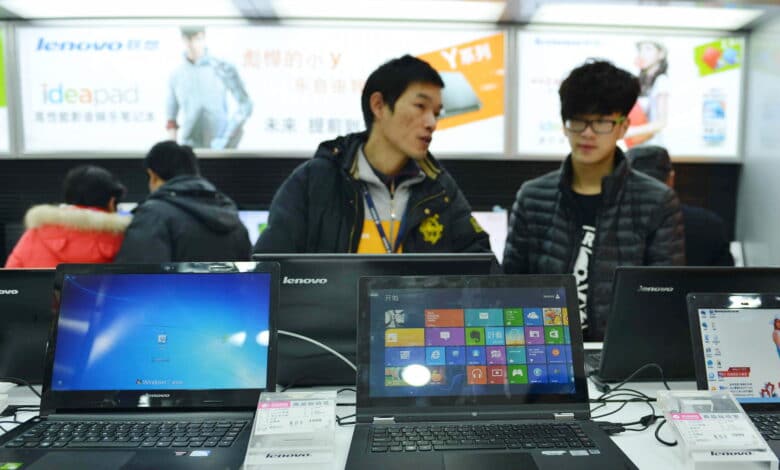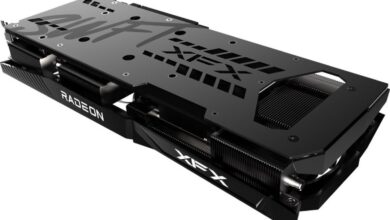
The People’s Republic of China apparently no longer trusts Western technology. It has now become known that the most populous country in the world does not want any PCs and software from Western brands to be used in public institutions. In view of the many Chinese electronics manufacturers, replacements will probably be found quickly.
Banning Western technology
Can you imagine an open-plan office without PCs, monitors or other IT technology from manufacturers like Dell or HP? The Chinese government apparently can. At least, that’s what a somewhat government-ordered restructuring in Chinese government agencies and other public institutions indicates. According to insider information, which the news agency Bloomberg refers to, no device with the logo of HP, Dell or other large Western manufacturers will be allowed to enter within the next two years. Instead, only Chinese brands are to be used. Of course, we are not talking about peanuts for such a big country like China. Bloomberg states that it should be about 50 million PCs that come from relevant Western companies. While China certainly has suitable hardware, it could be difficult with the software.
Since this is also supposed to be banned from the offices, the Chinese authorities will have to say goodbye to Windows or ChromeOS in two years at the latest. For Microsoft as the tech company behind Windows and the corresponding Office applications, this will probably mean an economic broadside. The company will not only lose important revenues. On top of that, they had put a lot of effort into launching a special edition for China especially for Windows 10. This investment no longer seems to be profitable – at least if the Chinese government actually sticks to the leaked plans. The stock market reacted promptly, especially with HP and Dell. Thus their share price sank and lost 2.5 percentage points.
More security through less dependence
With its step, the government in the Middle Kingdom quite obviously wants to strengthen not only the domestic economy. Obviously, this is a clear signal to the USA. China is striving for more independence when it comes to the technology sector. This is not an untypical approach when you look at the economic relationship between China and the USA in recent years. In particular, the Chinese tech company Huawei, which has the reputation of being state-controlled, makes this clear. The USA put the once successful smartphone and tablet manufacturer on its dreaded sanctions list. The reason given was the threat to national security. The USA feared that the Chinese government wanted to introduce Huawei devices into the broad society of the USA in order to use them as spying tools.
China’s rationale, however, appears to be somewhat different. After all, it is apparently important to the leadership to secure more independence. Here, the long-sought goal of “China Standards 2035” certainly plays a significant role. These are authoritative rules about artificial intelligence and machine learning that are to be created in the People’s Republic. If the government establishes its very own technology in authorities and other public agencies, this will naturally create completely different monitoring possibilities that can provide valuable insights in these areas. Of course, the Chinese tech companies concerned benefit from the announcement. In particular, corporations such as Lenovo and Kingsoft were able to celebrate tidy gains on the stock market floor.
No surprise for many
Meanwhile, one is not really surprised about the announcement. After all, there is a trade war and it was only a matter of time until China provides a suitable response for the US sanctions policy. Even if the government has not yet communicated the plans openly, the fear of unwanted surveillance in the authorities is certainly behind it to some extent. Accordingly, China would have liked to take this step a few years earlier. However, large domestic companies like Huawei or Lenovo needed some time to grow into real tech experts. Consequently, it should be possible to equip the authorities with national technology without any problems. However, this will not be 100 percent Chinese for the time being.
Lenovo, for example, still relies on chip technology from U.S. manufacturers such as Intel. However, the example of Huawei shows that this is not a new problem for China. Huawei already had to cope with the fact that it was no longer allowed to receive Western components. Without further ado, the company built up its own chip production. It is therefore not surprising that many US companies have pounced on Chinese companies in order to be able to continue to earn money in China. Microsoft in particular looked for some Chinese partners. However, if China implements its leaked plan, this will probably be the end in the long run.




No replies yet
Neue Antworten laden...
Gehört zum Inventar
Beteilige dich an der Diskussion in der Basic Tutorials Community →